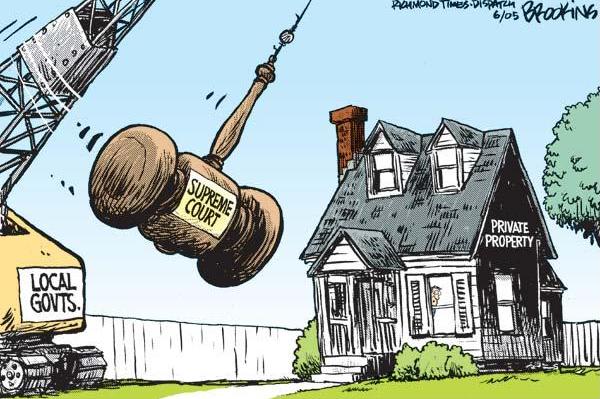From the December 2009 Idaho Observer:
2005 Eminent Domain ruling gives Feds the “right” to take your land
by Anne Wilder Chamberlain

Kelo v. City of New London, 545 U.S. 469 (2005) was decided by the Supreme Court of the United States involving the use of eminent domain to transfer land from one private owner to another to further economic development. The case arose from the condemnation by New London, Connecticut, of privately owned real property so that it could be used as part of a comprehensive redevelopment plan. The Court held in a 5–4 decision that the “general benefits a community enjoyed from economic growth” qualified such redevelopment plans as a permissible “public use” under the Takings Clause of the Fifth Amendment.
In the landmark case, the Supreme Court said the City of New London was within its rights to condemn and seize the property of nine citizens and provide that land to Pfizer, a multi-billion dollar drug corporation, for a $300 million research facility that was included in the city’s new development plan. The ruling set loose a wave of government seizures, including 700 acres in California owned by 246 different people, to be used for an automobile test track.
This fanned widespread fear that retailers such as Wal-Mart or Target – for research of course – would convince local governments to expand the scope of public use to include commercial entities such as shopping malls or independent retail stores, making it easier for these businesses to expand into markets where there is little open space to build new stores.
In response to the ruling, California developer Logan Darrow Clements of Natural-rights.org presented plans to the Weare, NH, city council for the construction of the Lost Liberty Hotel on the property owned by Supreme Court Justice David Souter, one of the assenting voters. The $100,000 property was only earning $2895 in taxes per year, and Clements assured the court his hotel would be paying the county much more than that, plus it would provide the local work force new employment opportunities. Over 1400 potential registrants signed up in two months to support the inn.
After months of negotiation, a “warrant article” was prepared and voted on at a town meeting on February 4, 2006. Voters reworded the article to call upon state legislators to oppose taking private property for use by private developers.
Although the ballot initiative supporting the Lost Liberty Hotel project went down in defeat on March 14, 2006, Clements got nationwide attention and support from states as far away as Washington and Texas, and the US House of Representatives voted 376-38 in November, 2005, to approve the Private Property Rights Protection Act of 2005 which would prohibit states and local communities receiving federal funds from invoking eminent domain as a means for private industry to build private businesses.
The bill would have allowed private property owners the right to sue the government if they were stripped of their land through the use of eminent domain and later found that the land was given to a private developer. David Snyder, an eminent domain attorney and partner at Fox Rothschild LLP said the legislation could hamper big business, and it was not passed by the Senate.
On April 2, 2009 similar legislation was introduced by Rep Maxine Waters (D-CA) with 26 cosponsors. HR 1885, the Private Property Rights Protection Act of 2009 prohibits a state, political subdivision, or the federal government from exercising its power of eminent domain for the purpose of economic development. On May 26 it was referred to the Subcommittee on the Constitution, Civil Rights, and Civil Liberties.

Home - Current Edition
Advertising Rate Sheet
About the Idaho Observer
Some recent articles
Some older articles
Why we're here
Subscribe
Our Writers
Corrections and Clarifications
Hari Heath
Vaccination Liberation - vaclib.org